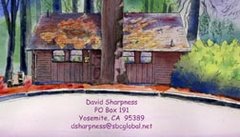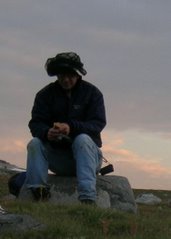
Got Reggae playing on N.
Watched the whole show, Nova's Absolute Zero...and it's interesting as there is a tie in to my thinking on the Ages...though a wide roundabout!...
Daniel and the Greeks listed the metals...Gold, Silver, Bronze, Iron...which..if I'm not mistaken...is close to the order on the Periodic Table...Bronze of course is a compound...tin and copper...but that snagged my thought...and made me wonder if the ancients ordered the "elements"...or whatever they called things...brb...
well...the Greeks thought of things as Earth, Air, Water, and Fire...and that's dissappointing...I'd think they would have collected minerals and distinguished them...maybe they did...but it's lost...lemego see if tin and copper are heavier than iron...yes...by atomic weights the order is right...gold silver bronze(tincopper) iron. Could..or did...the Greeks have a list of substances by weight!?
And now, the Absolute Zero show listed things by temperature...where gases became solids and liquids...things normally solid can be made into liquids and gasses if heated up enough!!..i think...
brb...well...here's a site that has what I was thinking of!...I wanted to see the periodic table...the relation of the elements to one another in that peculiar lay out..and the temperatures and how they overlapped on it...and..well...here it is!!
brb...gotta just look at this awhile!...tin silver gold copper iron...the order of those by melting points...which are freezing points too!...brb
well...I did a "why things melt" and "how things melt"...and it's a bit of a mystery...though wiki answers has it covered "when things are heated up they melt"!...this site tells the idea current..
unquote
When ice cubes melt, the solid crystals turn to water. It’s pretty simple, right? Not really, says physics professor Arjun Yodh, the James M. Skinner Professor of Science. “Melting is one of the most fundamental phenomena in physics, and yet there are lots of things we don’t understand about it..
unquote
there's an idea out there that the whole universe can be thought of as information...kinda just like the programming code that makes computers work...and mathematics that use this notion can explain a lot of things..or portray them in novel ways...brb...
quote
. What is the Fundamental Element of Our "Reality"?
Speculation and investigation about the nature of our universe is at least as old as recorded history. Early philosophers theorized that the most fundamental element in the universe was water. Later, as scientific knowledge began to mature, our view of the universe became more complex, and for many years there was a widely accepted belief that the four primary elements in our universe were earth, air, water, and fire. Later investigations have centered around chemical elements, then molecular structure, atomic elements, electrons, quarks, and so on.
More recently, the advent of quantum physics and the concepts comprising quantum mechanics have resulted in speculation by some of the world’s foremost thinkers that the most fundamental building block of the perceivable universe is none of these. It is in fact information.
Speculation and investigation about the nature of our universe is at least as old as recorded history. Early philosophers theorized that the most fundamental element in the universe was water. Later, as scientific knowledge began to mature, our view of the universe became more complex, and for many years there was a widely accepted belief that the four primary elements in our universe were earth, air, water, and fire. Later investigations have centered around chemical elements, then molecular structure, atomic elements, electrons, quarks, and so on.
More recently, the advent of quantum physics and the concepts comprising quantum mechanics have resulted in speculation by some of the world’s foremost thinkers that the most fundamental building block of the perceivable universe is none of these. It is in fact information.
The Quantum Universe: An Information Systems Perspective
Wm L. Duncan
quote
Well...that turned up a lot easier than I thought!...and fits right in!...brb...I have to try and read it now!!...well..it doesn't give an idea about "how things melt" could be modeled with an "information" explanation..basically what they are saying is the universe is dreamlike...susceptible to the subtleties of our emotions...I think they are thinking they can think things in and out of existence...how clever...and self centered!
I first read about this in a magazine that had a clever illustration on the cover...a normal looking person dissolving...melting!...into o and xs...or something like that!
well...it's getting deep!..
from "universe is a computer" search:
quote
Wolfram himself is a lapsed elementary particle physicist, and I suppose he can't resist trying to apply his experience with digital computer programs to the laws of nature. This has led him to the view (also considered in a 1981 article by Richard Feynman) that nature is discrete rather than continuous. He suggests that space consists of a network of isolated points, like cells in a cellular automaton, and that even time flows in discrete steps. Following an idea of Edward Fredkin, he concludes that the universe itself would then be an automaton, like a giant computer. It's possible, but I can't see any motivation for these speculations, except that this is the sort of system that Wolfram and others have become used to in their work on computers. So might a carpenter, looking at the moon, suppose that it is made of wood.
Is the Universe a Computer?
By Steven Weinberg
A New Kind of Science
by Stephen Wolfram
Wolfram Media, 1,197 pp., $44.95
By Steven Weinberg
A New Kind of Science
by Stephen Wolfram
Wolfram Media, 1,197 pp., $44.95
Feynman is interesting...his anecdotal books for the layman are entertaining...and maybe more complex than the first impression!!
Of course much of all this I cant make heads or tails....
Curious the author talks about 'broken symmetry"...when a thing melts...it's symmetry breaks down...I think I have that right...brb...
quote
In organic chemistry Carnelley’s Rule established in 1882 by Thomas Carnelley, states that high molecular symmetry is associated with high melting point
unquote
Yes!..above is where I just saw it...I dont know if that works in inorganic chemistry...the elements...is tin more symmetrical than gold?...oh...gold is more amorphous...soft...I guess...and couldn't search that thought out!!...it's very late..I need to go to sleep...
for the sleepless...
DavidDavid
Tree in the Door



No comments:
Post a Comment